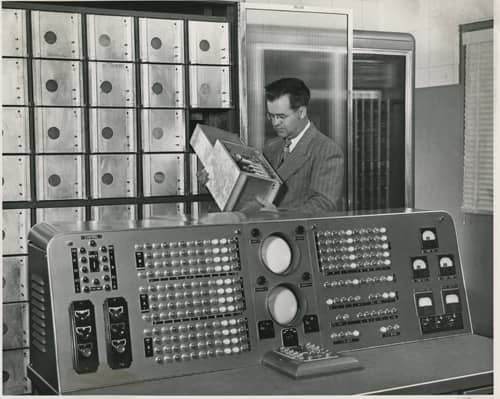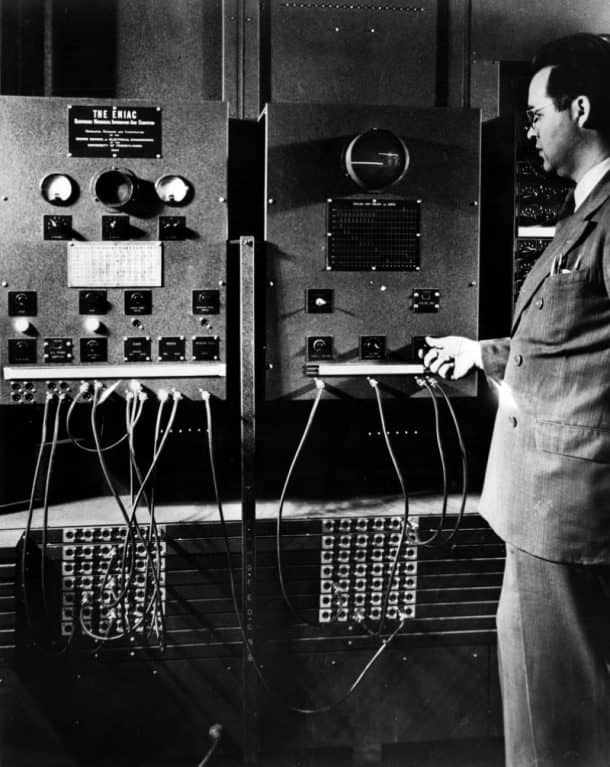Engineer Harry Huskey, the pioneer of the first ever computer, has died aged 101. Dr. Huskey is credited to build the famous Electronic Numerical Integrator and Computer (ENIAC) back in February 1946, which was one of the first electronic and programmable computers.
Dr. Huskey also worked on the Ace – the Automatic Computing Engine – a design presented by Alan Turing.
The Eniac measured more than 100ft (30m) in length and 30 tons in weight. The computer was built at the University of Pennsylvania in the 1940s and used 18,000 valves and 1,500 relays. It was also the first general purpose computer and required massive rewiring on its various units to reprogram it for different activities.

Dr. Huskey became part of the ENIAC team after joining the University of Pennsylvania as a mathematics teacher for the Naval recruits. He came up with the part that used a punch card reader to make the machine work along with writing technical manuals on its operations.
ENIAC was used to calculate the trajectory of shells for the US army in the second world war. After the war, Dr. Huskey helped Alan Turing in the UK to complete the Ace at the National Physical Laboratory. And when the design was completed in 1950, it was the fastest computer in the world.

Huskey is also the creator of two other machines – the Swac (Standards Western Automatic Computer) and the G-15 which weighing almost a ton but was the closest thing to a personal computer since it could be operated by one person.
“Harry basically lived through and participated in the entire span of the history of electronic computing,” Dag Spicer, a curator at the Computer History Museum, told the New York Times.
Dr. Huskey spent his career teaching computing at the University of California, Berkeley and is also one of the founders of the computer science faculty at UC Santa Cruz.



This just smacks a bit of nationalism and propaganda. It says “Pioneer of the first ever computer.” That’s a LIE. The first real computer, i.e., one that could be programmed was BRITISH. It was invented in the UK by a man named Jeffrey Turing, the man whom “The Imitation Game” is based upon. Unlike the ENIAC, his computer, the Bombe, used rotating disks that were used to decipher codes to unscramble morse coded messages. These were scrambled first by an ingenius German device called the Enigma, which used rotors to scramble the messages.
I noticed how the writer tried to make it sound like Turing only contributed a small part in the development of the computer. That couldn’t be further from the truth. He worked out the mathematics behind making the computer run, not just its construction.
The Bombe could scroll through every setting for each rotor in minutes, saving the codebreakers enormous amounts of time. This solved another problem: the information was still fresh so they had a more accurate description of the location of the German forces. It shortened the war both in Europe and North Africa. And before anyone tries to say “We’re just commenting on one guy,” I have to add this: Remember that silly little movie U571? Yeah, they also wrote the British out of that movie too by trying to make it look like the US captured the Enigma machine. In reality, the Enigma CODES were found on the sub by the British because the U-boat captain forgot to destroy them.
The codes found on the U-boat were sent to England and they found out how the German Kriegsmarine were double-encrypting the messages. They also were shocked to learn that the German Navy were using a heavily modified Enigma with an extra rotor. Normal Enigmas had three rotors but the navy demanded four on theirs. The US was NOT involved in the capture of the code papers. Please, give your allies credit for their contributions. It’s no wonder some of them secretly despise us today. How would these story writers feel if someone claimed the US had nothing to do with the Battle of the Bulge? Yes, when a British general did that, the Americans screamed and cried about it. This “America, fuck yeah!” attitude is so 1940s and is certainly not appropriate when dealing with topics like this.
Peace.